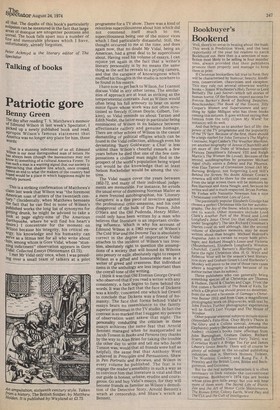Talking of books
Patriotic gore
Benny Green
The day after reading T. S. Matthews's memoir of Edmund Wilson in last week's Spectator, I Picked up a newly published book and read, apropos Wilson's famous statement that America was no longer any place for him, these words:
That is a stunning indictment of us all. Edmund Wilson is our most distinguished man of letters. He as always been (though the bureaucrats may not !tnow it) something of a cultural America Firster. To lose such a man is a warning signal that our society is approaching that shadow line which, once crossed, means an end to what the makers of the country had hoped would be a place in which happiness might be usefully pursued.
This is a striking confirmation of Matthews's claim last week that Wilson was "the foremost American man of letters of the twentieth century." (Incidentally, when Matthews bemoans the fact that he can find in none of Wilson's Pixblished works the long list of synonyms for getting drunk, he might be advised to take a look at page eighty-nine of The American Earthquake, where he will find his heart's desire) I concentrate for the moment on Wilson because his integrity, his critical energy, his knowledge and his humanity can him as a litmus test for all who write about in!nl, among whom is Gore Vidal, whose "stunning indictment" observation appears in Gore Vidal: Collected Essays (Heinemann £3.75).
, I met Mr Vidal only once, when I was presiding over a small team of talkers at a pilot programme for a TV show. There was a kind of relentless superciliousness about him which did not commend itself much to me, superciliousness being one of the minor vices which I find particularly distasteful. Still, the thought occurred to me at the time, and does again now, that no doubt Mr Vidal, being an American, had a great deal to be supercilious about. Having read his volume of essays, I can rejoice yet again in the fact that a writer's literary personality is by no means the same thing as the self he reveals to a prying camera, and that the carapace of knowingness which muffled his thoughts in the studio is nowhere to be found in his essays.
I have now to get back to Wilson, for I cannot discuss Vidal in any other terms. The similarities of approach are at least as striking as the temperamental contrasts. Just as Wilson would often bring his full armoury to bear on some minor figure whose work was not often scrutinised so fiercely (Conan Doyle, Gilbert, Tolkien), so Vidal reminds us about Tarzan and Edith Nesbit, the latter essay in particular being reminiscent of Wilson in its balance between affectionate raillery and genuine homage. There are other echoes of Wilson in the casual dismantling of political effigies which can be found in the Vidal collection, although even his devastating 'Barry Goldwater: a Chat' is less unkind than Wilson's cheerful remark a few years before he died that one of the few compensations a civilised man might find in the prospect of the world's population being wiped out would be the knowledge that at least Nelson Rockefeller would be among the victims,
The Vidal essays cover the years between 1952-72, and many of their individual judgements are memorable. For instance, he avoids the usual error of dismissing Norman Mailer as a mere frenzied autobiographist, his 'Literary Gangsters' is a fine piece of invective against the professional critic-assassins, and his cool disapproval of the bulk of Dos Passos, John O'Hara and the Old Pudenda, Henry Miller, could only have been written by a man who believes that literature is an important civilising influence. Which is why his account of Edmund Wilson in a 1963 review of Wilson's The Cold War and the Income Tax is absolutely correct in the degree of importance Vidal attaches to the incident of Wilson's tax troubles, absolutely right to question the assumptions of a society that will hound its Wilsons into penury or exile, absolutely right to respect Wilson as a gifted and honourable man in a welter of greed and crassness. But individual items in the anthology are less important than the overall tone of the writing.
I think it was that Old Etonian George Orwell who observed that if you read a writer with any consistency, a face begins to form behind the words. It was the fact that the face of Dickens was a kindly, concerned one which led Orwell to conclude that Dickens was a friend of humanity. The face that forms behind Vidal's essays bears no resemblance to the faintly superior gentleman in the TV studio. In fact the contrast is so marked that I suggest my powers of observation went askew that night. The personality conducting the criticism in these essays achieves the same feat that Arnold Bennett managed when he masqueraded as Jacob Tonson in Books and Persons (my thanks by the way to Alan Brien for taking the trouble the other day to write and tell me who Jacob Tonson was; would that all friends were half as helpful), the same feat that Anthony West achieved in Principles and Persuasions, Shaw in Pen Portraits and Reviews, and Wilson in every volume he published. The feat is to engage the reader's sensibility in such a way as to convince him that literature is vital and that our guide is honest, urbane, erudite and courageous. Go and buy Vidal's essays, for they will become friends as familiar as Wilson's demolition of the Detective Story, Arnold Bennett's wrath at censorship, and Shaw's wrath at Bennett.


































 Previous page
Previous page